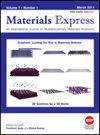Total alkaloids of Sophora alopecuroides alleviate atherosclerosis by regulating macrophage pyroptosis induced by reactive oxygen species-NLRP3 signaling axis
IF 0.7
4区 材料科学
Q3 Materials Science
引用次数: 0
Abstract
Cardiovascular and cerebrovascular diseases are common diseases. This study aimed to investigate the role of total alkaloids of Sophora alopecuroides (TASA) in atherosclerosis and exploring the underlying mechanism. Mice were given normal diet (ND), high-fat diet (HFD), and TASA plus ND or HFD. The mice were further administered with NLRP3 shRNA and shControl. After treatment, Hematoxylin and Eosin and Oil Red O staining assessed histological changes. CD31/caspase-1 double staining was detected by fluorescent staining and pyroptosis expression assessed by CD31/TUNEL double staining. Western blot results determined caspase-1 expression in HFD mice. TASA treatment suppressed plaque formation in HFD-fed ApoE-/- mice but insignificantly altered the lesion area in ND-fed ApoE-/- mice. Caspase-1 content and TUNEL positive cells were significantly elevated in mice fed with HFD or ND, whilst advent of TASA further enhanced the activation of caspase-1 in HFD mice. TASA treatment reduced activity of ROS, inhibited NLRP3 inflammasome and regulated macrophage pyroptosis. Inhibition of NLRP3 decreased the lesion area of atherosclerosis and lipid deposition. TASA inhibited the expression of ROS to reduce macrophages necrosis and secretion of inflammatory mediators, thereby alleviating inflammation, delaying plaque formation and stabilizing plaques in atherosclerosis.苦参总生物碱通过调节活性氧- nlrp3信号轴诱导的巨噬细胞热亡来缓解动脉粥样硬化
心脑血管疾病是常见病。本研究旨在探讨苦豆子总生物碱(TASA)在动脉粥样硬化中的作用及其机制。小鼠分别给予正常饮食(ND)、高脂肪饮食(HFD)和TASA + ND或HFD。小鼠进一步给予NLRP3 shRNA和shControl。治疗后,苏木精、伊红及油红O染色评估组织学变化。荧光染色检测CD31/caspase-1双染色,CD31/TUNEL双染色检测焦亡表达。Western blot检测HFD小鼠caspase-1的表达。TASA治疗抑制了hfd喂养的ApoE-/-小鼠斑块的形成,但对nd喂养的ApoE-/-小鼠的病变面积没有显著改变。饲喂HFD或ND的小鼠Caspase-1含量和TUNEL阳性细胞均显著升高,而TASA的出现进一步增强了HFD小鼠Caspase-1的活化。TASA治疗可降低ROS活性,抑制NLRP3炎性体,调节巨噬细胞焦亡。抑制NLRP3可减少动脉粥样硬化病变面积和脂质沉积。TASA抑制ROS的表达,减少巨噬细胞坏死和炎症介质的分泌,从而减轻动脉粥样硬化的炎症,延缓斑块形成,稳定斑块。
本文章由计算机程序翻译,如有差异,请以英文原文为准。
求助全文
约1分钟内获得全文
求助全文
来源期刊

Materials Express
NANOSCIENCE & NANOTECHNOLOGY-MATERIALS SCIENCE, MULTIDISCIPLINARY
自引率
0.00%
发文量
69
审稿时长
>12 weeks
期刊介绍:
Information not localized
 求助内容:
求助内容: 应助结果提醒方式:
应助结果提醒方式:


